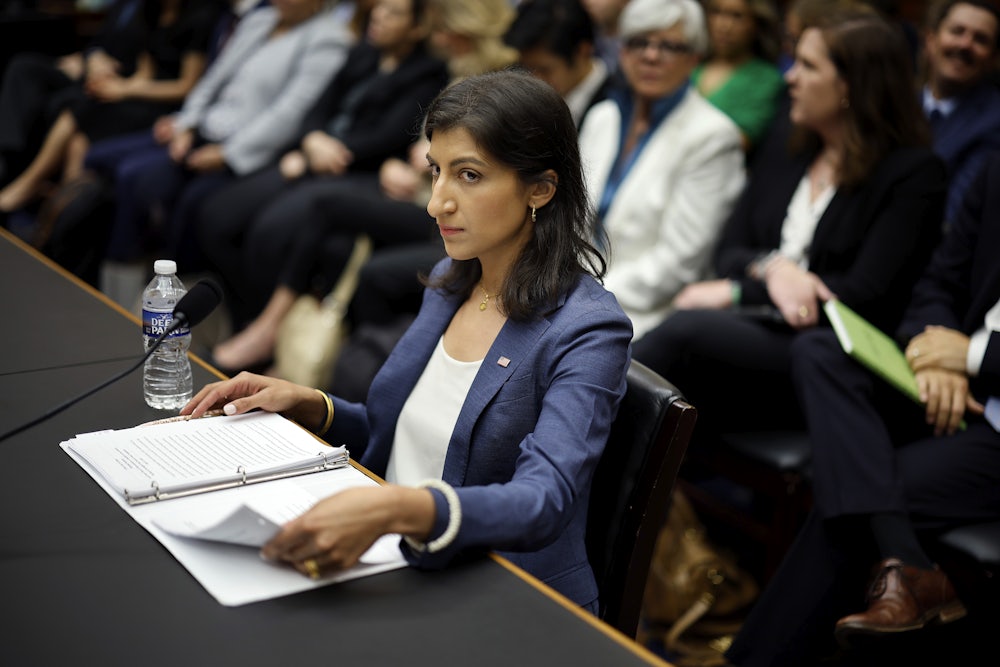Two disappointing omissions from the Federal Trade Commission’s antitrust complaint against Amazon last October were the words “wages” and “union.” I’m pleased to report that these words appear in the FTC’s antitrust complaint against the proposed Kroger-Albertsons supermarket merger, the text of which the agency made public Monday night.
Late last year FTC Chair Lina Khan and Justice Department antitrust chief Jonathan Kanter issued revised antitrust guidelines, stating that in addition to raising prices and lowering quality, the two agencies would consider whether a proposed merger would reduce wages for the working stiffs punching time clocks at the combined companies. This was more a revival than an innovation; wages are a consideration to which antitrust hasn’t paid much attention since Robert Bork’s 1978 book The Antitrust Paradox consigned them to the dustbin in the 1980s. (If you think history will remember Bork as the guy whom Senator Ted Kennedy denied a Supreme Court seat in 1987, guess again; Bork will be remembered as the guy who eviscerated antitrust enforcement for four decades by insisting that it focus narrowly on a “consumer welfare standard.”)
The new antitrust guidelines bid adieu to Bork and warn that henceforth, the agencies would no longer consider a merger justified if it created efficiencies through “an increase in monopsony power”—that is to say: if it would free the boss to set wages as low as he damned well pleased. The FTC’s antitrust complaint against the proposed Kroger-Albertsons marriage follows through on that warning.
Before I lavish praise on this document, allow me to air a few editorial criticisms. The complaint is less cogent than an article I posted here last week explaining why said merger would be terrible. I’m not a lawyer, but the FTC has made certain redactions that I find perplexing. One sentence begins promisingly, “For example, when rumors of a merger emerged, one Albertsons executive stated,” with the rest blocked out. Readers of my piece will know that what that unnamed Albertsons executive purportedly said was: “You are basically creating a monopoly in grocery with the merger [so] it makes no sense.” I know this because the quotation appears in an antitrust complaint filed by Washington state Attorney General Robert Ferguson. (I don’t know Ferguson’s source.)
I also find it perplexing that the FTC complaint never states in plain English what combined market share of the domestic grocery market a Kroger-Albertsons would command. The answer is about 17 percent. Executives at Kroger and Albertsons argue that their merger is needed to check the combined market power of Walmart and Sam’s Club, which account for 30 percent of all groceries bought in the United States. Thirty percent is quite a lot.
I answered the Kroger and Albertsons executives’ self-justifying argument with the argument that when you fight market concentration with more market concentration, the end result is not going to be less market concentration. The FTC complaint, informed by a superior understanding of antitrust law, goes to great lengths to argue that the (unmentioned) 30 percent market share enjoyed by the Walmart-Sam’s Club configuration shouldn’t count because these are club stores, and club stores “require membership fees, typically offer larger package sizes,” and “have fewer store locations,” among other differences. But as my fifth-grade teacher Miss Cooperman would say, “What has that got to do with the price of rice in China?” Whatever the distinctions between supermarkets and club stores in terms of convenience, these haven’t gotten in the way of Walmart-Sam’s Club gobbling up 30 percent of the nation’s grocery market share. You can’t just say it doesn’t count. Let’s hope the FTC is investigating Walmart-Sam’s Club’s grocery business, too.
Where the FTC complaint is very good is the way it addresses the impact the Kroger-Albertsons merger would have on wages. It’s a tricky topic because Kroger and Albertsons are both unionized. Market concentration is less obviously a bad thing for workers in a unionized workplace because it’s always possible the union might find a way to compel management to share monopoly profits with workers. That’s basically how it went down for U.S. Steel employees in the 1950s and 1960s, before global competition spoiled the party.
But the FTC complaint sets forth a plausible counterargument. In many metropolitan areas, including Los Angeles, Colorado Springs, and Spokane, the combined Kroger-Albertsons would command more than 65 percent of all union grocery labor, a percentage that’s potentially sufficient to push down wages. The FTC complaint further points out that the United Food and Commercial Workers, or UFCW, has been pretty crafty about playing Kroger against Albertsons in the past:
In January 2022, UFW Local 7 struck Kroger’s King Soopers supermarket in the Denver, Colorado [collective bargaining agreement] area. Leading up to and during the strike, Kroger’s union grocery workers encouraged Kroger customers and employees to transfer their prescriptions to and shop at Albertsons stores instead of Kroger stores.
There follows one-third of a page of redacted material, the gist of which appears to be that an aggrieved Kroger called the UFCW a wascally wabbit for inviting customers to buy from their competitors but eventually admitted defeat. The UFCW “then took the Kroger agreement to Albersons, threatening that it would strike Albertsons next” if it didn’t match Kroger’s wage increases and benefit improvements. That deft maneuver wouldn’t be possible if Kroger and Albertsons were one company.
In making public a preliminary version of her revised antitrust guidelines last July, Khan noted that even as Borkian antitrust enforcement during the past several decades ignored labor markets, empirical research piled up showing that market concentration reduced wages. That was, in fact, her very first point. Now Khan is applying monopsony analysis to a unionized market sector. I don’t know whether she can sell it to a judge, but her daring to try is awfully refreshing.










